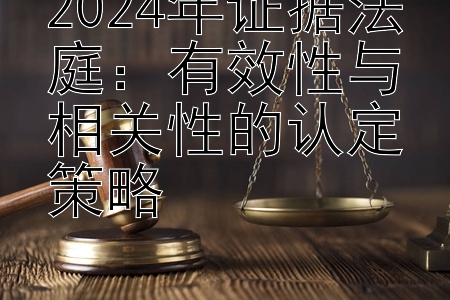2024年证据法庭:有效性与相关性的认定策略
在21世纪的法治社会中,证据是司法审判的核心要素。它不仅是法官裁判的基础,也是保障诉讼参与人合法权益的重要手段。随着科技的发展和社会的进步,证据的形式和种类不断更新,对法官和律师的证据审查能力提出了新的要求。本文旨在探讨如何在2024年的法庭上有效地认定证据的有效性和相关性,并提供相应的策略和建议。
一、什么是证据的有效性和相关性?
有效性(Admissibility)是指证据被允许进入审判程序的资格,即该证据是否符合法律规定的形式要件,以及是否通过合法的手段取得。例如,证人证言必须是在宣誓后作出的;物证必须是通过合法途径获得的等。如果证据缺乏有效性,那么它就不能作为定案依据。
相关性(Relevance)则指证据与案件事实之间的逻辑联系,即该证据是否能证明或否定某个重要的事实问题。相关性的判断通常基于两个标准:一是直接相关性,即证据可以直接证明或反驳某一主张;二是间接相关性,即证据可能引导发现其他具有直接相关性的证据。然而,即使证据具有相关性,法院也可能因为公共政策或其他考虑而排除其使用。
二、有效性与相关性的认定策略
(一)
(二) Evidence Law and the Challenge of Admissibility in Courtrooms of 2024: Strategies for Determining Effectiveness and Relevance
In a society governed by law at the turn of the twenty-first century, evidence is the core element of judicial trials. It not only serves as the basis for judges' judgments but also plays an important role in safeguarding the legitimate rights and interests of litigants. With technological advancements and social progress, the forms and types of evidence are constantly updated, which puts forward new requirements for the evidentiary review capabilities of judges and lawyers. The purpose of this article is to explore how to effectively determine the effectiveness and relevance of evidence in courtrooms of 2024, providing corresponding strategies and suggestions if possible, combined with relevant case laws.
I. What Are Effectiveness and Relevance? Effectiveness (admissibility) refers to whether evidence meets the formal conditions required by law and can be admitted into the trial process legally. This includes whether the evidence was obtained through lawful means and whether it conforms to legal procedures. If evidence lacks effectiveness, it cannot serve as a basis for judgment.
Relevance, on the other hand, refers to the logical connection between evidence and facts in the case, that is, whether the evidence can prove or refute certain significant factual issues. Judging relevance usually involves two standards: direct relevance, where the evidence directly proves or disputes a claim; and indirect relevance, where the evidence may lead to the discovery of other evidence with direct relevance. However, even if evidence is relevant, courts might exclude its use due to considerations such as public policy or other factors.
II. Strategies for Determining Effectiveness and Relevance (i) Ensuring Compliance with Legal Procedures Determining the admissibility of evidence often hinges upon compliance with legal procedures during its collection, preservation, and presentation. In 2024, courtroom technology will likely play a pivotal role in ensuring chain of custody and authenticity of electronic data. For example, blockchain technology could be used to create tamper-proof records of digital evidence. Additionally, strict guidelines must be followed regarding witness testimony, including proper identification, authentication, and cross-examination processes. Failure to comply with these protocols may render evidence inadmissible.
(ii) Balancing Probative Value against Prejudice The probative value of evidence indicates its capacity to prove or disprove material facts, while prejudice refers to the potential for unfairly influencing the jury or prejudicing a party's right to a fair trial. According to Rule 403 of the Federal Rules of Evidence, relevant evidence may be excluded if its probative value is substantially outweighed by the danger of unfair prejudice, confusion of the issues, or misleading the jury. Lawyers and judges should carefully weigh these concerns when evaluating the admissibility of evidence.
(iii) Utilizing Expert Testimony and Scientific Analysis As science continues to advance, expert witnesses and scientific analysis become increasingly crucial in determining the reliability of novel evidence like DNA testing, computer forensics, or voice recognition software. In 2024, courts will likely demand higher standards of proof from experts, requiring them to demonstrate the validity and reliability of their methods before their findings can be considered admissible.
(iv) Considering Ethical and Policy Considerations Beyond traditional legal criteria, ethical and policy implications may influence the admission of evidence. For instance, privacy concerns over personal information disclosed by electronic devices or surveillance footage might affect the admissibility of such evidence. Similarly, the need to protect vulnerable populations, such as victims of sexual assault or children, might result in special rules governing the handling of sensitive evidence.
III. Conclusion Effective determination of evidence effectiveness and relevance requires a comprehensive understanding of evolving legal principles, technological developments, and societal expectations. By adopting strategic approaches and staying abreast of changes in the legal landscape, judges and attorneys can ensure that evidence presented in 2024 courtrooms contributes meaningfully to just outcomes without compromising fairness or integrity in the judicial process.